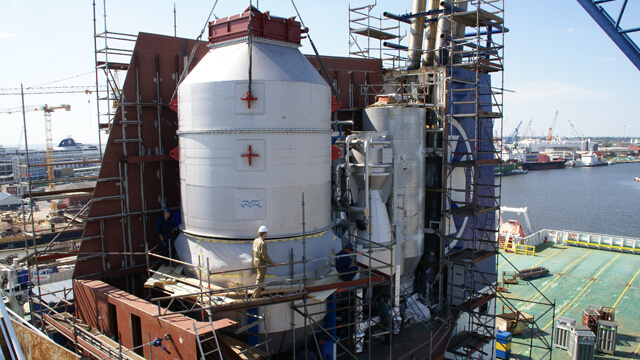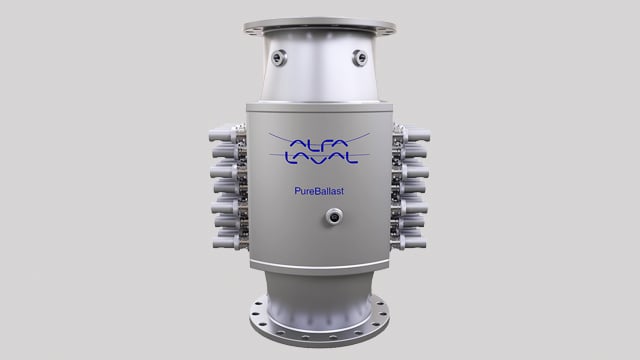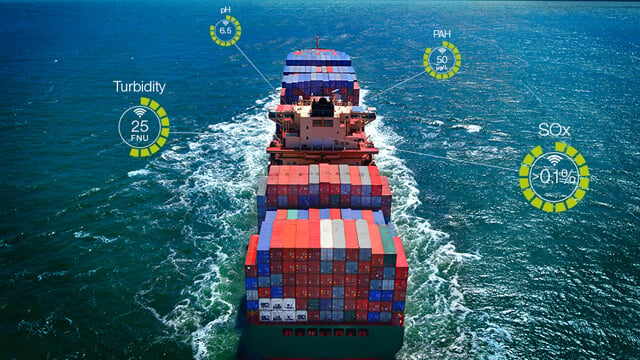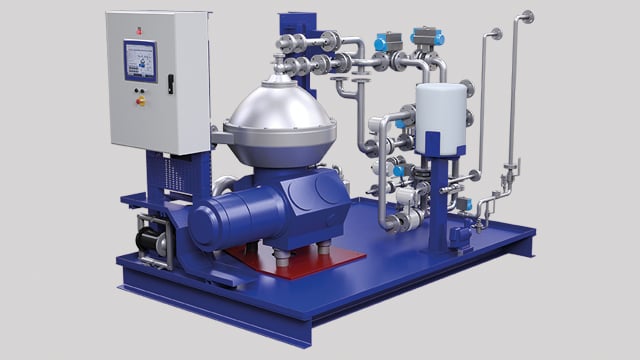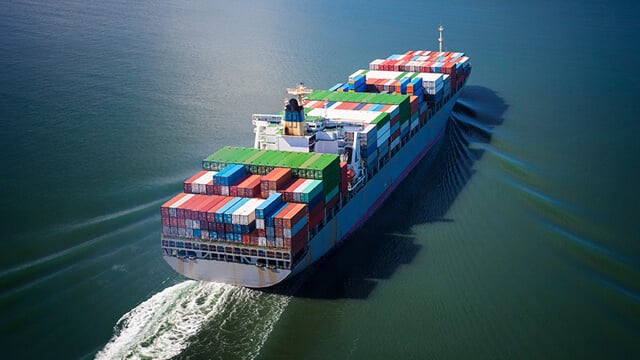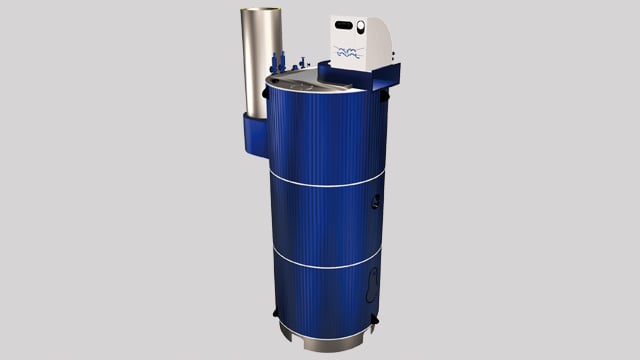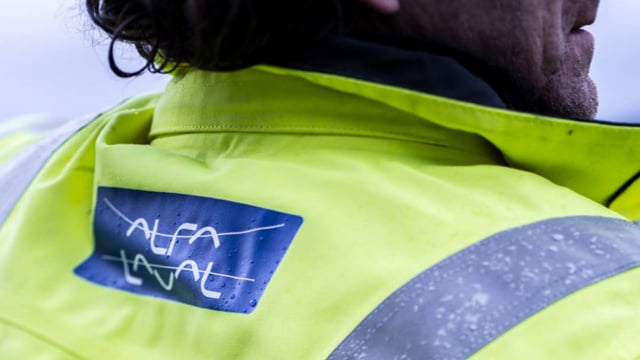Repairing boilers and building trust: Alfa Laval Field Service Engineers go the distance for customers
This year marks 100 years since the first Aalborg marine boiler was shipped from Aalborg, Denmark. As Alfa Laval celebrates the centennial, the renowned Aalborg name continues to travel the world, represented especially by Alfa Laval Field Service Engineers (FSEs). Ready at a moment’s notice, these capable specialists show that Aalborg boiler expertise is very much alive – especially when it comes to repairing boilers and getting customers’ operations back to 100%.
DATE 2023-11-27In 2001, Kim Skatka Nielsen found himself in the boiler of an American container ship on its way to Europe, together with his team of welders. For four days, the weather had been so bad that the mess room was covered deep in spilled liquids. Items attached to the bulkheads had pulled away from their fixtures, and twice the ship’s engine had stalled. But work on the boiler continued, uninterrupted despite the churning sea.
“Things were so rough that we had to brace ourselves inside the boiler,” Skatka Nielsen relates. “We took all the necessary safety precautions and were able to put up a wooden construction that held us in a position where we could do the welding. So while no food could be cooked in the galley, down in the boiler we got the repair done.”
A global journey that began in Aalborg
Skatka Nielsen is an Alfa Laval Field Service Engineer (FSE) working with boiler repair, as is his friend Niels Henrik Poulsen. In their early 50s, the two men share a sense of adventure, determination and a deep history with Alfa Laval Aalborg boilers. “Kim and I started working in Aalborg on the same day back in 1985, when we became boilermaker apprentices at the old Aalborg shipyard,” says Poulsen. “That was a three-and-a-half-year programme, hands on, with mechanical and welding education. We really learned just about everything.”
Today, Skatka Nielsen and Poulsen are still putting those skills to use. As FSEs, they carry out boiler inspections on board, travelling at a moment’s notice to anywhere in the world. Often sailing with a vessel from one port to another, they investigate boiler damage and determine what must be done by Alfa Laval boilermakers to get the boiler back in service. In some cases, they also spend time on board as supervisors for the repair teams.
“The job is a cooperation between execution, sales and engineering,” Poulsen says. “But we’re the first people on site – the ones who conclude what we need to do to set the boiler right.”
Determining needs and planning details
According to Skatka Nielsen, coordination and planning are major aspects of work as an FSE. “Ideally, we do the repair at a convenient point in the customer’s voyage, where we can fix it without any downtime for them,” he says. “If it’s a minor repair, we can bring material and fix it on the spot just to get the ship moving again. But most repairs require first an inspection, then planning, material orders and the fabrication of parts.”
“Sometimes the parts are so big that they can’t be transported into the engine room,” Poulsen adds. “Maybe a plate has to be divided into two pieces, so the engineering department needs to know how to split up the boiler and do the welding. That’s why it’s so important to send someone out to the ship for a clear picture.”
Besides planning the work, the two FSEs decide what tools will be needed to perform it, plus how much gas will be needed for the repair – a crucial calculation. “If you don’t have enough on board to do the welds, you have a big problem,” Poulsen grins.
Expecting the unexpected – and solving it
Even with the best planning, not everything in a boiler repair can be foreseen. But according to Skatka Nielsen, this is a big part of the job’s appeal. “We’re a 100-year-old company, so there are things we do that are repeat tasks,” he says. “But there’s always something new that comes up, and we’re attracted to the very complex challenges that have to be solved.”
Those challenges can be daunting indeed. Logistically, they may involve arranging for 50 tonnes of steel to arrive in a specific port at a given time. Even when the materials are on board, the boiler itself cannot be lifted and turned by crane as it could be in a workshop. And if a boiler replacement is needed while the ship is in service, it involves removing the damaged boiler with flame cutters and precisely welding the new unit – all while the vessel is pitching and rolling.
“I remember one job where we replaced a huge exhaust gas boiler over three levels,” Poulsen recalls. “The elements were big, but we didn’t want to split them up and create even more welds. In the end we actually cut a hole in the ship casing, which meant we had to create a sealable hatch in order for the vessel to continue sailing. But that still left lots of tubes and 850 joining welds to perform, and there wasn’t room for all the old scrap elements on board. We had to plan things very carefully, so that we could alternate the disposal of old elements with taking new ones on board.”
Times change, but not the urgency
Naturally, there are some aspects of the work that have grown easier over time. Above all, it’s far easier to contact and receive support from the repair department back in Aalborg. When Skatka Nielsen and Poulsen started out, there were no conveniences like e-mail and mobile phones. “If you had an issue while you were on board, you just had to figure it out,” says Skatka Nielsen, “because there was no help from anywhere.”
What hasn’t changed – and never will – is the need to mobilize on short notice. When a boiler fails somewhere in the world, the customer who relies on it can’t afford to be kept waiting. “Sometimes you have a ship that’s basically dead in the water because the boiler’s not working,” says Skatka Nielsen, who explains that an FSE can always be dispatched within a matter of hours. “Everything is very time-critical for ship owners. A medium or large vessel can cost 50,000 or even 100,000 dollars a day if it’s idle, so they need it fixed immediately.”
Poulsen nods in agreement. “The crews are normally very happy when I arrive,” he says. “They’re waiting for me because they want to use the boiler!”
Relationships are built on board
As Skatka Nielsen and Poulsen both suggest, the sense of urgency about the job quickly brings them close to the customer. So too does the proximity on board, especially when an FSE travels with the vessel for a longer period of time. “On some jobs you may become more than a part of the crew, because you’re actually on the vessel for longer than the crew,” Statka Nielsen explains. “During an extended repair, crew members may have time to leave for vacation and come back again before it’s done.”
In all those hours together, there’s downtime for sharing a cup of coffee or even watching a movie together in the evening. But more importantly, there’s time to talk face to face.
“When we’re out doing inspections and repair, we have the opportunity to really talk to the chief engineers and not just the technical officer, who might be in an office somewhere else,” says Skatka Nielsen. “We can really talk in depth about their operations and about Alfa Laval products, supporting them in ways that go beyond the repair work.”
A source of pride and a way of life
The responsibility that Skatka Nielsen and Poulsen feel to their customers is evident when they speak, along with their pride in their role as FSEs. No matter how many hours the two men spend at sea, they never seem to tire of the demanding work. Even at home, they find themselves looking forward to the next voyage, the next boiler challenge.
Perhaps Poulsen sums it up best. “It’s a good feeling to know that in the next hour I might be on a plane, instead of going to the same workshop every day,” he says. “It’s a lifestyle, and I know that Kim would say the same thing.”
To learn more about Alfa Laval Aalborg boilers and Alfa Laval’s approach to boiler service, visit www.alfalaval.com/marine.
Other articles
Tags
Alle
